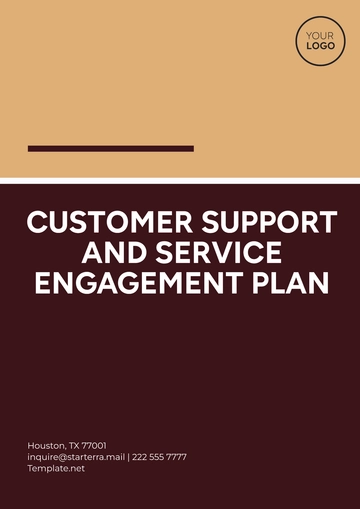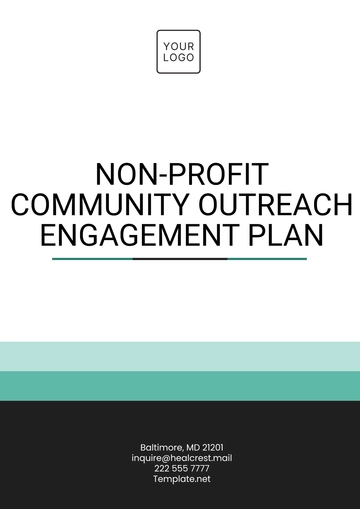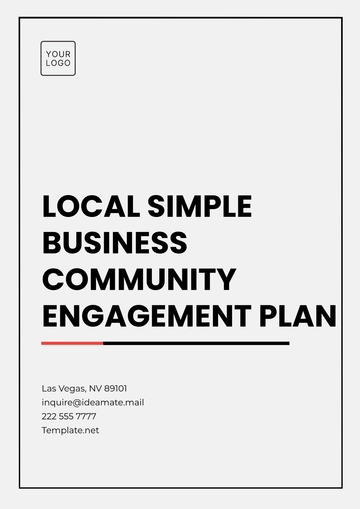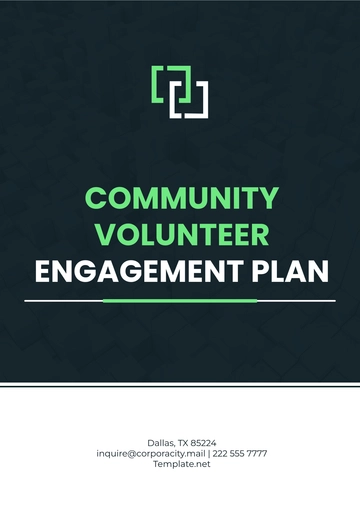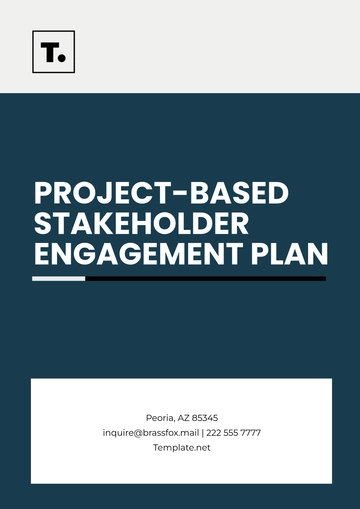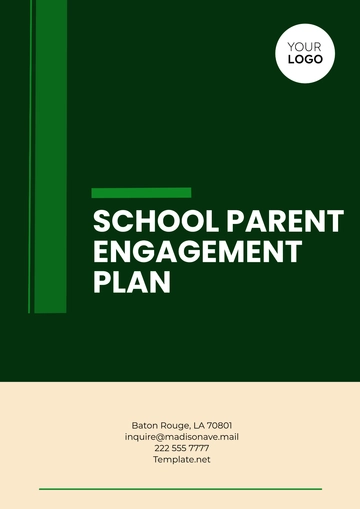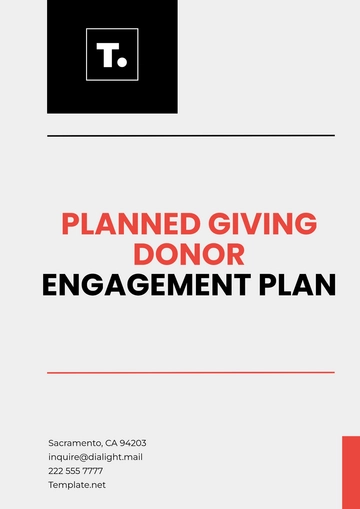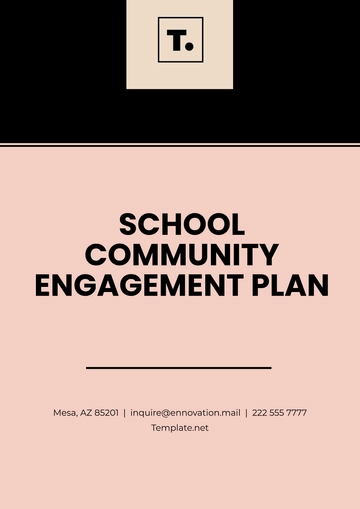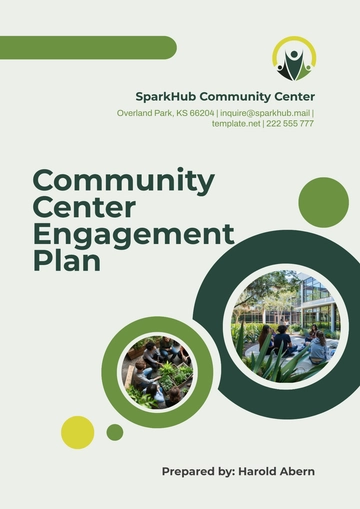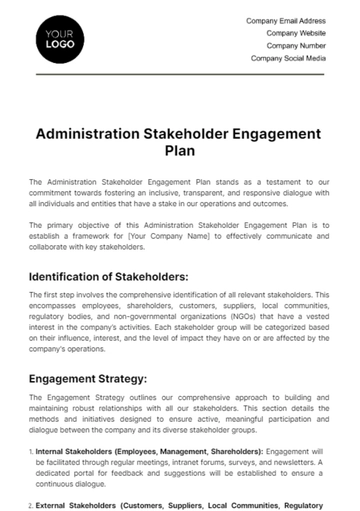Free Community Volunteer Engagement Plan
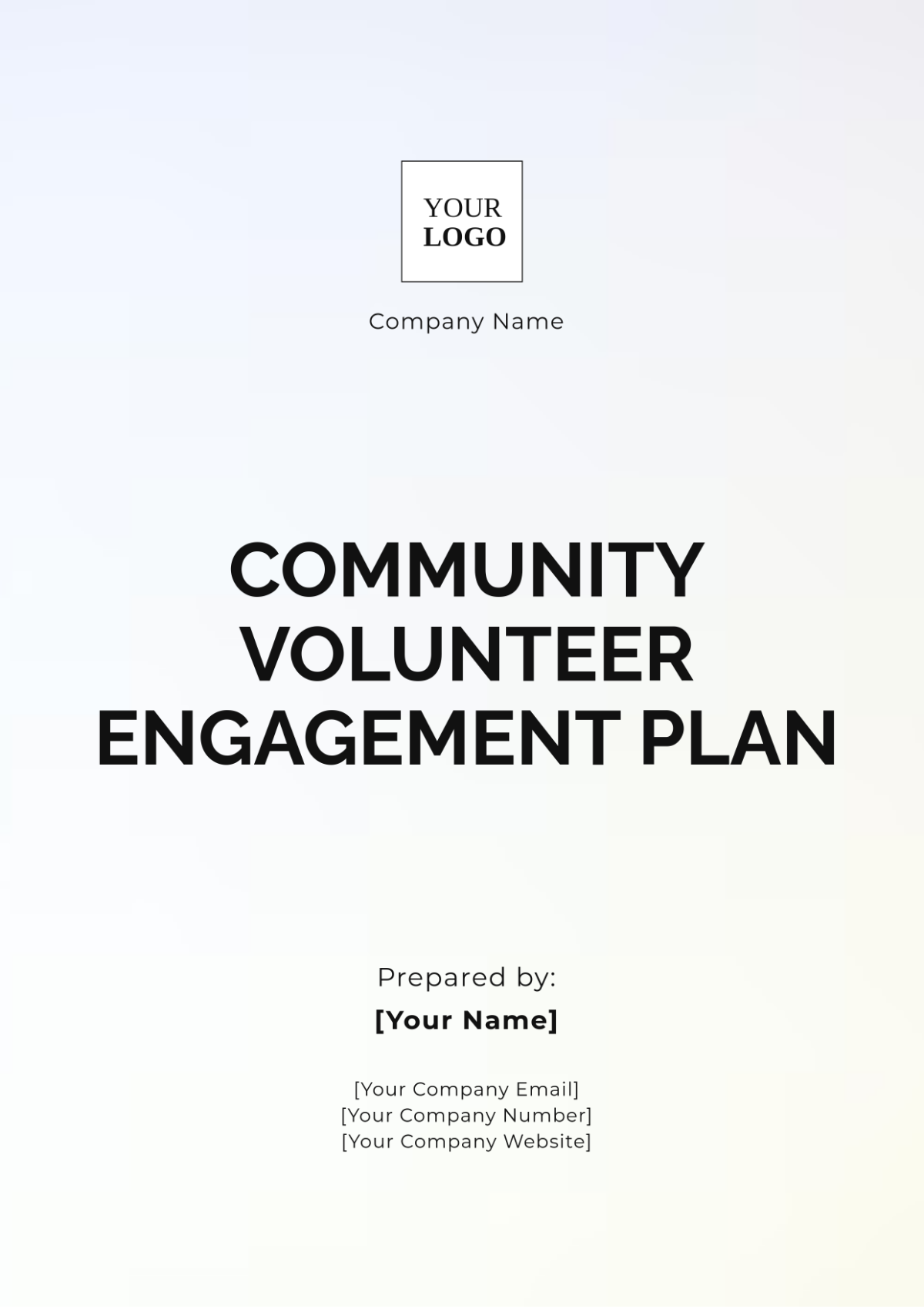
Prepared By: [Your Name]
Date: June 5, 2050
Organization Name: [Your Company Name]
1. Introduction
This Community Volunteer Engagement Plan outlines the strategies and actions necessary to effectively recruit, train, and retain volunteers. The plan aims to enhance volunteer engagement, increase community involvement, and maximize the impact of volunteer contributions within the specific context of the organization’s mission and goals.
2. Goals and Objectives
2.1 Goals
Increase Volunteer Recruitment: Attract a diverse range of volunteers to support the organization’s initiatives.
Enhance Volunteer Training and Support: Provide comprehensive training and ongoing support to ensure volunteers are equipped to succeed in their roles.
Recognize and Appreciate Volunteers: Establish recognition programs that celebrate volunteer contributions and foster a sense of community.
2.2 Objectives
Recruit at least 100 new volunteers by the end of the year.
Implement a volunteer training program by the end of the first quarter.
Develop a volunteer recognition program to be launched within six months.
3. Target Audience
Current Volunteers: Engage and retain existing volunteers by enhancing their experience within the organization.
Prospective Volunteers: Reach out to individuals who have expressed interest in supporting the mission.
Community Members: Encourage participation from diverse demographics within the community, including families, students, retirees, and professionals.
4. Strategies
4.1 Recruitment
Outreach Initiatives:
Host community events and information sessions to promote volunteer opportunities, such as open houses or volunteer fairs.
Utilize social media platforms (Facebook, Instagram, LinkedIn) and local media outlets (newspapers, radio) to advertise volunteer roles and share success stories.
Partner with local schools, businesses, and organizations to reach potential volunteers, offering presentations about how they can get involved.
Targeted Campaigns:
Develop campaigns targeting specific demographics, such as youth engagement programs in schools or senior volunteering initiatives in community centers.
Create engaging materials (flyers, brochures, videos) that highlight the impact of volunteering and the various roles available.
4.2 Training and Support
Comprehensive Orientation:
Implement an onboarding program for new volunteers, including orientation sessions that cover the organization’s mission, goals, and volunteer expectations. These sessions can be held monthly to accommodate new volunteers.
Skill Development Workshops:
Provide continuous training sessions on subjects pertinent to the roles of volunteers, like leadership, communication, and project management, and supply resources such as manuals, handouts, and online training modules accessible via a dedicated volunteer portal or website.
Mentorship Programs:
Pair new volunteers with experienced mentors to provide guidance, support, and a sense of community. This can include regular check-ins and feedback sessions.
4.3 Recognition and Appreciation
Recognition Events:
Organize annual appreciation events (e.g., volunteer awards ceremonies, and community picnics) to celebrate volunteer contributions and highlight success stories.
Publicly recognize volunteers through social media shout-outs, newsletters, and local press releases, creating a volunteer spotlight feature in monthly communications.
Incentive Programs:
Create a points system where volunteers can earn rewards for their hours of service, redeemable for gift cards, merchandise, or community recognition.
Provide certificates of appreciation or small tokens of gratitude for milestones reached, such as the completion of a project or volunteer anniversary.
5. Implementation Timeline
Activity | Responsible Party | Timeline |
|---|---|---|
Community outreach events | Volunteer Coordinator | Month 1 |
Launch a social media recruitment campaign | Marketing Team | Month 1 |
Develop volunteer training materials | Training Team | Month 2 |
Conduct orientation sessions | Volunteer Coordinator | Month 3 |
Launch volunteer recognition program | Volunteer Coordinator | Month 4 |
Evaluate engagement and impact | Evaluation Team | Month 6 |
6. Evaluation and Impact Assessment
Feedback Surveys: Distribute surveys to volunteers after training sessions and events to gather feedback and suggestions for improvement, using online tools for easy analysis.
Volunteer Retention Rates: Track the number of volunteers who continue their service over time to assess retention efforts, aiming for at least 75% retention annually.
Impact Measurement: Establish metrics to measure the impact of volunteer contributions on the organization’s goals, such as service hours logged, projects completed, and community feedback through testimonials or surveys.
7. Conclusion
This Community Volunteer Engagement Plan serves as a roadmap for fostering a thriving volunteer community. By implementing targeted recruitment strategies, providing comprehensive training and support, and recognizing the invaluable contributions of volunteers, the plan aims to create a positive and impactful volunteer experience that benefits both individuals and the organization. This plan can be adjusted to fit specific local needs, ensuring that it effectively supports the mission and enhances community engagement.
- 100% Customizable, free editor
- Access 1 Million+ Templates, photo’s & graphics
- Download or share as a template
- Click and replace photos, graphics, text, backgrounds
- Resize, crop, AI write & more
- Access advanced editor
Foster a thriving volunteer community with the Community Volunteer Engagement Plan Template from Template.net. This editable and customizable template empowers you to design effective strategies for recruiting and managing volunteers. With our AI Editor Tool, you can easily tailor your plans to fit your organization’s goals, ensuring meaningful engagement and impactful results. Get started today!
You may also like
- Finance Plan
- Construction Plan
- Sales Plan
- Development Plan
- Career Plan
- Budget Plan
- HR Plan
- Education Plan
- Transition Plan
- Work Plan
- Training Plan
- Communication Plan
- Operation Plan
- Health And Safety Plan
- Strategy Plan
- Professional Development Plan
- Advertising Plan
- Risk Management Plan
- Restaurant Plan
- School Plan
- Nursing Home Patient Care Plan
- Nursing Care Plan
- Plan Event
- Startup Plan
- Social Media Plan
- Staffing Plan
- Annual Plan
- Content Plan
- Payment Plan
- Implementation Plan
- Hotel Plan
- Workout Plan
- Accounting Plan
- Campaign Plan
- Essay Plan
- 30 60 90 Day Plan
- Research Plan
- Recruitment Plan
- 90 Day Plan
- Quarterly Plan
- Emergency Plan
- 5 Year Plan
- Gym Plan
- Personal Plan
- IT and Software Plan
- Treatment Plan
- Real Estate Plan
- Law Firm Plan
- Healthcare Plan
- Improvement Plan
- Media Plan
- 5 Year Business Plan
- Learning Plan
- Marketing Campaign Plan
- Travel Agency Plan
- Cleaning Services Plan
- Interior Design Plan
- Performance Plan
- PR Plan
- Birth Plan
- Life Plan
- SEO Plan
- Disaster Recovery Plan
- Continuity Plan
- Launch Plan
- Legal Plan
- Behavior Plan
- Performance Improvement Plan
- Salon Plan
- Security Plan
- Security Management Plan
- Employee Development Plan
- Quality Plan
- Service Improvement Plan
- Growth Plan
- Incident Response Plan
- Basketball Plan
- Emergency Action Plan
- Product Launch Plan
- Spa Plan
- Employee Training Plan
- Data Analysis Plan
- Employee Action Plan
- Territory Plan
- Audit Plan
- Classroom Plan
- Activity Plan
- Parenting Plan
- Care Plan
- Project Execution Plan
- Exercise Plan
- Internship Plan
- Software Development Plan
- Continuous Improvement Plan
- Leave Plan
- 90 Day Sales Plan
- Advertising Agency Plan
- Employee Transition Plan
- Smart Action Plan
- Workplace Safety Plan
- Behavior Change Plan
- Contingency Plan
- Continuity of Operations Plan
- Health Plan
- Quality Control Plan
- Self Plan
- Sports Development Plan
- Change Management Plan
- Ecommerce Plan
- Personal Financial Plan
- Process Improvement Plan
- 30-60-90 Day Sales Plan
- Crisis Management Plan
- Engagement Plan
- Execution Plan
- Pandemic Plan
- Quality Assurance Plan
- Service Continuity Plan
- Agile Project Plan
- Fundraising Plan
- Job Transition Plan
- Asset Maintenance Plan
- Maintenance Plan
- Software Test Plan
- Staff Training and Development Plan
- 3 Year Plan
- Brand Activation Plan
- Release Plan
- Resource Plan
- Risk Mitigation Plan
- Teacher Plan
- 30 60 90 Day Plan for New Manager
- Food Safety Plan
- Food Truck Plan
- Hiring Plan
- Quality Management Plan
- Wellness Plan
- Behavior Intervention Plan
- Bonus Plan
- Investment Plan
- Maternity Leave Plan
- Pandemic Response Plan
- Succession Planning
- Coaching Plan
- Configuration Management Plan
- Remote Work Plan
- Self Care Plan
- Teaching Plan
- 100-Day Plan
- HACCP Plan
- Student Plan
- Sustainability Plan
- 30 60 90 Day Plan for Interview
- Access Plan
- Site Specific Safety Plan


